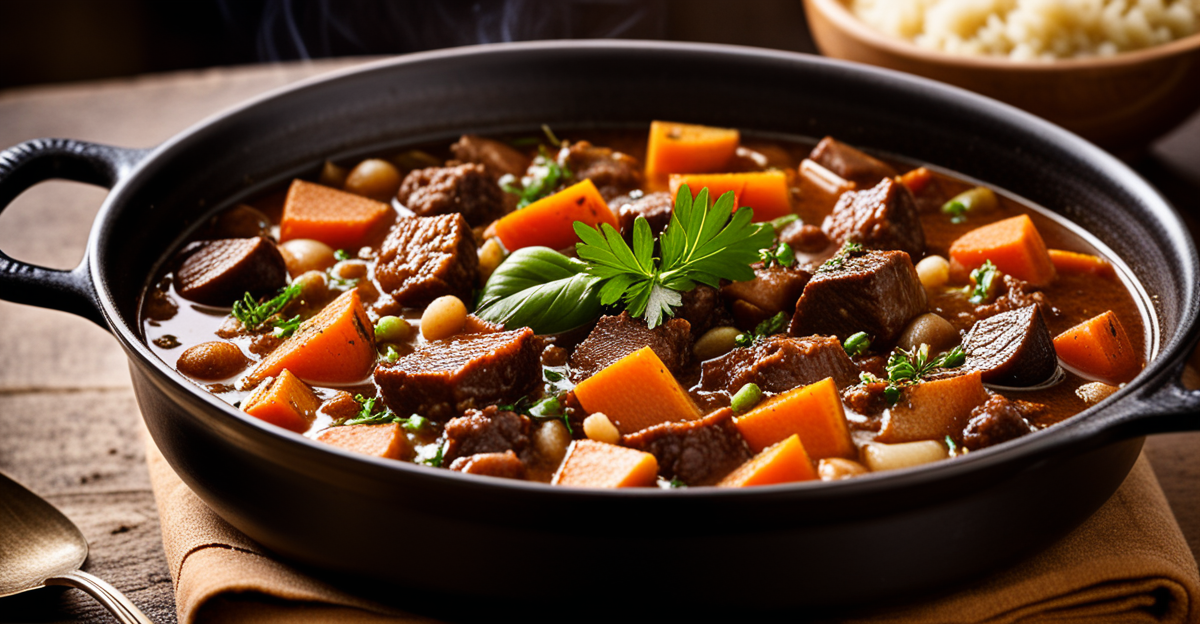Key nutrients in traditional British stews
Traditional British stews are a treasure trove of nutritional value, thoughtfully combining ingredients that provide essential vitamins, fiber, and protein. Root vegetables like carrots, parsnips, and potatoes enrich stews with vitamins A, C, and K. These vitamins support everything from vision and immune function to blood clotting and bone health.
Lean meats such as beef or lamb contribute high-quality protein, vital for muscle repair and overall bodily functions. Beans also frequently appear in some recipes, boosting both fiber and protein content while offering a plant-based nutrient source. Fiber in root vegetables and beans promotes prolonged fullness and aids digestion, making stews especially satisfying.
Have you seen this : How can you create a delicious and authentic toad in the hole?
Herbs such as thyme, rosemary, and parsley add micronutrients and antioxidants, enhancing both flavour and health benefits. When considering the role of British stews in a balanced diet, their combination of macronutrients and micronutrients makes them a wholesome, filling meal option. They naturally support sustained energy levels and nutritional needs, particularly important during colder months or physically demanding days. This nutrient profile indicates why traditional British stews have remained a popular choice for families seeking nourishing, comforting meals.
Health-promoting properties of British stew ingredients
Traditional British stews offer more than just comfort; their ingredients provide multiple health benefits that support the immune system and overall wellness. Root vegetables like carrots and onions are rich in antioxidants, compounds that protect the body from oxidative stress and reduce inflammation. These antioxidants help bolster the immune response, making stews a valuable meal during cold or flu seasons.
Also to read : What are the traditional techniques for making Cornish pasties?
Herbs such as thyme and rosemary contribute additional antioxidant properties, enhancing the stew’s ability to support health beyond basic nutrition. The natural compounds in these herbs can also have mild antibacterial effects, which further help the immune system stay resilient.
Dietary fiber from vegetables and beans plays a crucial role in digestion. Fiber improves gut health by promoting regular bowel movements and feeding beneficial gut bacteria. This, in turn, supports the immune system indirectly since a large portion of immune function is linked to digestive health.
Moreover, fiber intake is associated with heart health benefits, including lowering cholesterol levels and stabilising blood sugar. This combination of antioxidants and dietary fiber makes traditional British stews a balanced way to nourish the body comprehensively. Integrating these ingredients into meals helps maintain both digestive health and immune defence effectively.
Calorie content and suitability for different diets
Traditional British stews often serve as low-calorie options due to their water-rich vegetables and lean meats, making them ideal for weight management. A typical stew combines ingredients that provide satiety without excessive calories, helping control portion sizes naturally. For those concerned about calorie intake, stews offer a fulfilling meal without compromising on flavour or nutritional density.
These stews are highly adaptable to various dietary suitability needs. Vegetarian versions, replacing meat with beans or lentils, maintain a strong protein and fiber profile, suitable for plant-based diets. Gluten-free diets can also benefit, as most traditional stew ingredients are naturally gluten-free, though caution is advised with added thickeners or processed stocks.
To reduce calories and fat further, consider trimming visible fat from meats before cooking and using low-fat broth alternatives. Slow cooking with herbs and spices enhances flavour, meaning less need for added fats or salt. This adaptability ensures British stews remain a versatile, healthy option across different dietary preferences, promoting balanced nutrition while respecting individual dietary choices.
Calorie content and suitability for different diets
Traditional British stews can be excellent low-calorie options for those focused on weight management. Their rich composition of vegetables, lean meats, and beans delivers a nutrient-dense yet filling meal that naturally controls hunger without excess calories. For example, substituting fattier cuts with leaner meats or increasing vegetable proportions reduces overall calorie and fat content.
These stews adapt well to diverse dietary suitability needs. Vegetarian versions rely on beans, root vegetables, and herbs to maintain high fiber and protein levels. Gluten-free diets also accommodate British stews easily, since they typically avoid wheat-based thickeners. Moreover, low-fat versions can be prepared using minimal oil and lean cuts, ensuring flavour remains intact.
To reduce calories while preserving taste, one can:
- Increase the ratio of root vegetables and beans to meat.
- Use broth or stock with controlled salt levels instead of heavy gravies.
- Incorporate herbs and spices like thyme and rosemary to enhance flavour naturally.
These strategies support enjoying traditional stews within various dietary frameworks, demonstrating their versatility as wholesome, nutritious meals.
Expert recommendations and research findings
Experts in nutrition consistently highlight the benefits of traditional British stews as part of a healthy diet. UK health authorities recommend incorporating meals rich in fiber, protein, and vitamins—elements abundant in these stews. Studies show that eating such nutrient-dense meals regularly can aid in maintaining stable energy levels and supporting immune function.
Research underscores the importance of combining lean meats, root vegetables, and herbs to maximize nutrient absorption. For instance, vitamins A, C, and K found in these ingredients work synergistically, enhancing antioxidant effects that protect cells from damage. Dietary fiber, emphasized by experts, not only supports digestion but also contributes to heart health by regulating cholesterol and blood sugar.
Authoritative sources suggest cooking methods like slow simmering preserve the nutritional value of ingredients while intensifying flavor. They also advise balancing portions to maintain calorie control without sacrificing satiety. By following these expert guidelines, home cooks can optimise the health benefits of their stews, making them both nourishing and enjoyable daily meals. This approach aligns with scientific evidence advocating for whole foods and balanced nutrient intake to promote long-term wellness.
Historical and cultural context of health benefits
Traditional British stews hold deep roots in British cuisine, reflecting a history grounded in practicality and nourishment. Historically, these stews emerged from the need to create wholesome meals using readily available, seasonal produce and cuts of meat. This approach ensured families consumed nutrient-rich food in a cost-effective way, especially during colder months. The reliance on local root vegetables and lean meats highlights a tradition of utilising ingredients that provided sustained energy and essential vitamins, supporting overall health.
Stews functioned not only as comfort food but also as a vital source of nutrition for households, embodying an accessible method of preserving and enhancing the nutritional value of ingredients through slow cooking. This tradition continues to thrive within British households, where stews remain popular for their balance of nutritional value and affordability.
Moreover, the cultural emphasis on sharing and communal dining with stews fosters social bonds while promoting healthful eating. The historical context showcases how British stews have long served dual roles: offering both sustenance and a connection to culinary heritage. This enduring relevance underscores their place as a nutritious, family-friendly meal choice.





